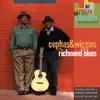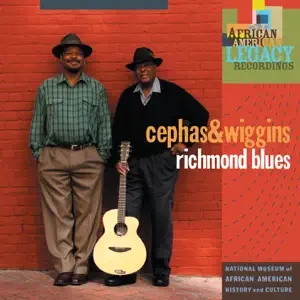


ORIGEN
Bowling Green, VA
Acerca de Cephas & Wiggins
The duo of acoustic guitarist John Cephas and harpist Phil Wiggins enjoyed a partnership spanning several decades, during which time they emerged among contemporary music's most visible exponents of the Piedmont blues tradition. Both were born in Washington, D.C., although Wiggins was a quarter century younger than his partner; they met at a jam session in 1977, and both performed as regular members of Wilbert "Big Chief" Ellis' Barrelhouse Rockers for a time prior to Ellis' death. Their music, rooted in the rural African-American dance music of Virginia and North Carolina, showed the influence of Blind Boy Fuller, Gary Davis, and Sonny Terry, with a broad repertoire consisting of Piedmont blues standards as well as an eclectic sampling of Delta stylings, R&B, ballads, ragtime, gospel, and country & western; onward from their 1984 debut, Sweet Bitter Blues, Cephas & Wiggins' sound applied sophisticated traditional instrumentation and modern gospel-edged vocals to both traditional standards and their own hard-hitting compositions, offering a soulful acoustic option to electric blues. A popular festival act, they also issued LPs including 1986's W.C. Handy Award-winning Dog Days of August, 1988's Walking Blues, 1992's Flip, Flop and Fly, and 1996's Cool Down. They kept going strong and in 1999 released their ninth album, Homemade, on the legendary Alligator label. In 2000, Bullseye Blues issued From Richmond to Atlanta, a compilation of tracks from Cephas & Wiggins' three Flying Fish albums recorded between 1984 and 1992. The duo continued to tour and play festivals, helping to keep the Piedmont sound alive. In the summer of 2002, they released Somebody Told the Truth, a mixture of old and new tracks that reintroduced them to the next generation of blues fans. Shoulder to Shoulder appeared in 2006 from Alligator Records. Richmond Blues followed in 2008 from Smithsonian Folkways. ~ Barry Lee Pearson & Richard Skelly
Nosotros
Notas
